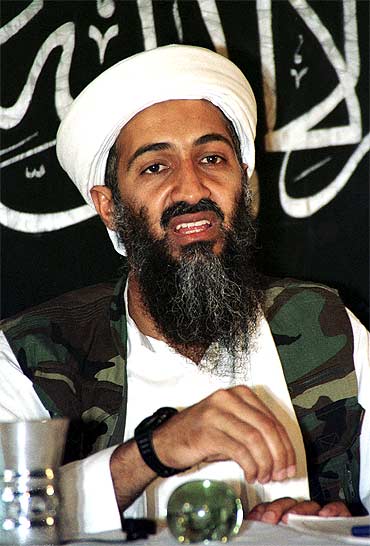
With the death of the terrorist mastermind, the emergence of a nuclear-equipped splinter group from within the Pakistani establishment looks disturbingly plausible, says Colonel Anil Athale (retd)
That the elusive terrorist mastermind Osama bin Laden will be found in an urban area in Pakistan was speculated for long by most serious analyst including this author. Right from September 2001, when bin Laden and Mullah Omar (the chief of the Afghan Taliban) along with them their entire families (including several wives, children and grandchildren) vanished into thin air, it was certain that they were under the protection of Pakistan Army/government (which in Pakistan is the same thing).
It was ridiculous to think that such a large entourage was hiding in some cave! That it took Americans so many years to trace bin Laden is itself a testimony to that fact. The Americans also must have known this for a long time.
But the finding and killing of bin Laden in a major military station confirms the collusion. Evidence has turned speculation into a fact. The Americans could no longer ignore it.
The significance of the killing of bin Laden in Abbotabad, a virtual military town, in an exclusively American planned operation is a turning point in the US-Pakistan relations. It signals, for the first time in last 63 years, that the Americans have finally understood that the Pakistan army is not an ally but an adversary.
The fact that Americans told the Pakistanis about the operation only after it was over, shows the degree of mistrust that exists between the so called allies in the war against terrorism.
...
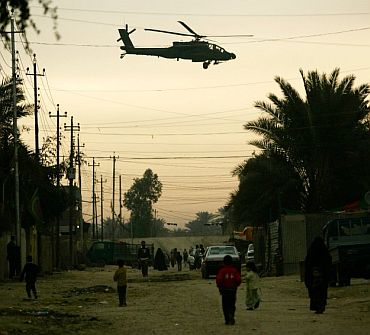
However, what the killing of bin Laden in a Pakistani military cantonment has brought home to the rest of the world in all its starkness is the fact that the Al Qaeda indeed enjoyed the Pakistani military's full support. Even the events of 9/11 had heavy Pakistani footprints.
After all it was Pakistan gateway that bin Laden and Al Qaeda used to carry out their world wide operations, based as they were in a landlocked Afghanistan. The post 9/11 American operations ought to have taken place in Pakistan as well -- that they did not happen is due to the fact that the Americans felt that the Pakistan Army was their 'client' asset and useful in the oil-rich Middle-East!
But the army that killed Palestinians with gusto in Jordan in the 1970s has changed. It is more 'Islamic' today, ironically by the efforts of very Zia-ul Haq who commanded the 2nd Jordanian Division during the infamous 'Black September' pogrom of Palestinians.
In the days to come, Americans will be inclined to go their own way in Afghanistan by virtually partitioning that country between Pashtun/Taliban dominated areas and Hazara/Northern Alliance controlled areas. With their bases in safe areas, with small numbers, the Americans seem confident to be able to contain Af-Pak region.
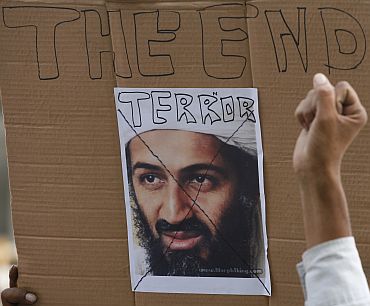
This would also free Americans from dependence on supply lines through Pakistan as alternative ones through Russia would suffice for the small numbers. Speculative articles on these lines have been floating in American professional journals for some time.
With the killing of bin Laden the end game in Afghanistan has begun! It also helps that with the operation that eliminated bin Laden has boosted US President Barack Obama's sagging public ratings. Next year he faces an election that now seems a little easier than a few weeks ago.
Another sound reason for the American action now is the situation in the Middle-East. Countries from ranging from Libya, Egypt, Syria, Yemen in the west to Bahrain in the east are in turmoil.
Most of the revolts are against the despotic rulers, and appear to be led by secular and not religious leadership. Thus the US may well have calculated that reaction if any to Bin Laden's killing will be muted. It does appear to be the case so far.
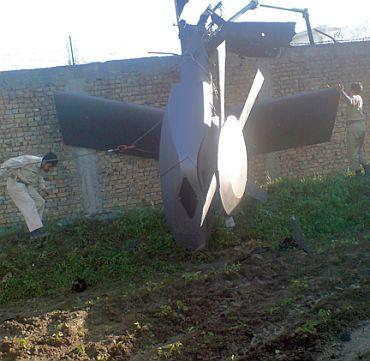
In the initial reports itself, the Americans claimed that one of their helicopters developed a snag and was blown up. But in the same breath Americans also claimed that they suffered no casualty in the entire operation. A story difficult to believe!
But reports in Pakistani papers on May 4 appear to clear the mystery.
Pakistani newspapers as well as Pakistan Military Review reported that a helicopter belonging to Army Aviation Corps crashed near Abbottabad on May 2 with one subedar major dead and five wounded.
According to the reports, the chopper was on a training flight when it crashed.
There is a deliberate fizzing of the date and it appears that the Americans are trying to cover the tracks. Most likely is the fact that at the last minute the Pakistanis got wind of the American operations and tried to rescue bin Laden.
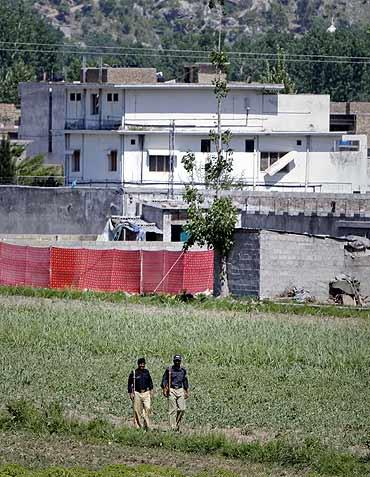
It has been over 48 hours since the news of bin Laden's killing and barring an odd protest in Quetta, most of Pakistan is quiet. Careful observation of many television channels of Pakistan show a clear body language that conveys shock and disbelief. This is but natural, for it was a common knowledge in Pakistan that bin Laden was very much in their country and being looked after by their valiant army. The shock is about the American action and apparent failure of Pakistani military to protect its 'honoured guest'.
Pakistani people are used to these collective lies and denials. In relation to India, it has been denying the presence of fugitive gangster Dawood Ibrahim (connected to terror attacks on Mumbai in 1993 and 2006) or for that matter its role in 26/11 attacks on Mumbai.
The denial mode dates back to 1947 when Kashmir was invaded by soldiers on leave, in 1965, the Pakistan army sent infiltrators and called them 'Kashmiri freedom fighters' and finally in May 1999 it sent soldiers of Northern Light Infantry and called them Kashmiri Mujahidin. The shock and discomfort so visible is not about the act of hiding bin Laden but about having been caught red handed!
But it would be huge mistake to think that there will be no reaction to bin Laden's death. More likely is the eventuality that coming Friday will see the sermons in mosques that will inflame people and organised rioting may take place.
Similar reaction is also likely in Kashmir and some other Muslim-dominated areas of India as well. Osama had become a Muslim icon who took on the might of the US seen as anti-Islam. His death is bound to have repercussions in most of South Asia.
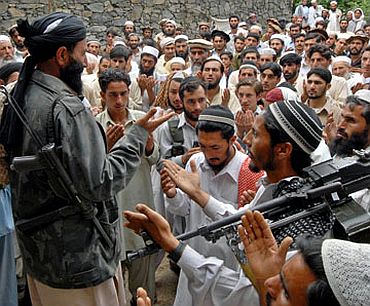
Every one accepts that death of bin Laden will not mean end to terrorism. Al Qaeda is less of an organisation than an idea of an Islamic Caliphate and Islamisation of the whole world.
In Pakistan itself, post its nuclear tests of 1998, there is a great sense of being the leader of the Islamic world by the virtue of being the only Islamic state wielding nuclear weapons.
The disturbing evidence that has surfaced of the complicity of the Pakistani military in protecting the Al Qaeda chief makes it eminently possible that Pakistani nuclear weapons may well reach Al Qaeda.
If one is to accept Pakistani protestations that the support to Al Qaeda was a low level or rogue operation even then the possibility of Pakistani nukes landing in Al Qaeda hands is ever present.
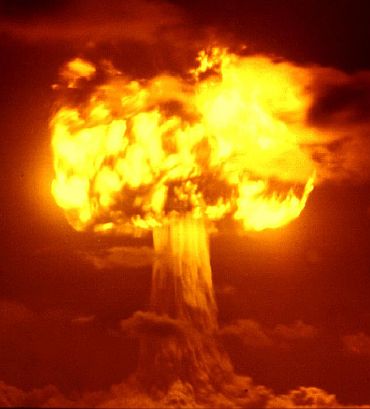
Graham T Allison, a Harvard professor writing in the Atlantic Monthly in October 2004, had clearly alerted the world to the looming threat. He mentions that in August of 2001, even as the final planning for 9/11 was under way, Osama bin Laden received two former officials of Pakistan's atomic-energy program -- Sultan Bashiruddin Mahmood and Abdul Majid -- at a secret compound near Kabul.
Over the course of three days of intense conversation, bin Laden and his second-in-command, Ayman al-Zawahiri, grilled Mahmood and Majid about how to make weapons of mass destruction.
After Mahmood and Majid were arrested, on October 23, 2001, Mahmood told Pakistani interrogation teams, working in concert with the CIA, that bin Laden had expressed a keen interest in nuclear weapons and had sought the scientists' help in recruiting other Pakistani nuclear experts who could provide expertise in the mechanics of bomb-making.
CIA Director George Tenet found the report of Mahmood and Majid's meeting with bin Laden so disturbing that he flew directly to Islamabad to confront Pakistan's President.
Now that Osama is dead, under these conditions the emergence of a nuclear-equipped splinter group from within the Pakistani establishment looks disturbingly plausible.
Provoked by anger due to the feeling that Pakistan is now a puppet of the United States, such a group would have not only a motive and the domestic political support for a nuclear terrorist act against America but also the organisational competence, the expertise, and the raw material to carry it out. The world has indeed entered a very dangerous phase.